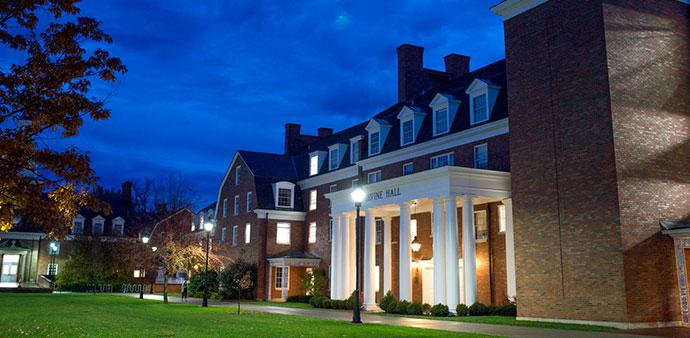
Irvine Hall
Our Facilities

Irvine Hall
Irvine Hall houses two large lecture halls for the Clinical Presentation Continuum curriculum and the small group rooms for the Patient Centered Continuum curriculum. It also contains the Ohio Musculoskeletal and Neurological Institute, Tropical Disease Institute, Clinical & Translational Research Unit, biomedical research labs, and the college’s communication office. It is also home to The Bricks, a space used for receptions and other college social gatherings.
Lecture Hall
The building’s two lecture halls let students and faculty take advantage of the very latest in educational technology. The resources include a student response system, built-in microphones on the desks, and plenty of outlets for laptops and other devices. All lectures that take place in the halls, which seat 168 and 120 students, are digitally recorded and available to students for download as MP3s. The larger of the two rooms has videoconferencing capabilities.
The rooms, which are the site of talks such as those by visiting speakers, are also the location for lectures to students in the Clinical Presentation Continuum―one of two curricular tracks offered at the Heritage College that provides a more structured, faculty-directed learning environment consisting of week-long modules based on clinical presentations of patient symptoms.
Small Group Meeting Rooms
Irvine houses several small group meeting rooms that are available to students in our Patient Centered Continuum, a curriculum that lets students set their own learning objectives based on patient-centered case studies designed by faculty.
Clinical & Translational Research Unit
The Clinical & Translational Research Unit (CTRU) is a centralized resource that supports Ohio University faculty, staff and students who conduct clinical research with human subjects. The CTRU is located primarily in Irvine Hall. The services offered by the CTRU range from study feasibility assessment to project coordination and implementation to final reporting. For more information about facilities and staff, as well as how to access our services, visit the CTRU portion of this web site.
Ohio Musculoskeletal and Neurological Institute
The Ohio Musculoskeletal and Neurological Institute (OMNI) is housed here at the Heritage College, but is an interdisciplinary institute with faculty affiliates spanning eight departments in four colleges—the Heritage College, Health Sciences and Professions, Engineering, and Arts and Science.
OMNI’s mission is to improve the diagnosis, treatment, and prevention of musculoskeletal and neurological disorders. Accordingly, OMNI scientists conduct basic and clinical research pertaining to the advancement of musculoskeletal and neurological health. OMNI has strong programmatic efforts in two research divisions: 1) musculoskeletal and neurological pain disorders, and 2) healthy aging. The research across these two divisions has an overarching aim of developing interventions that remove barriers to independent physical mobility and ultimately reduce disability.
Tropical Disease Institute
The Heritage College’s Tropical Disease Institute pursues strategies to eliminate or minimize the effects of infectious diseases. TDI faculty work in several labs across Ohio University’s Athens campus, but the institute is headquartered in Irvine Hall, where scientists conduct molecular biology and immunological research in three offices and four standard bench research labs. These spaces include three biosafety level two laboratories, where research is carried out with several infectious agents, including Trypanosoma cruzi, T. rangeli, leishmaniasis and Shigella dysenteriae. From the Irvine Hall location, TDI’s director oversees research efforts at a facility in Ecuador, where most of the institute’s international activities take place under the title Center for Infectious Disease Research.
The Ecuador facility is located at Catholic University’s main campus in Quito and is jointly administered by Catholic University, Ohio University and TDI. The building houses a staff of 20, including four researchers, eight technicians, a data manager, graduate students, an administrative associate and a projects manager. The space includes offices, Biosafety Level 1 and 2 labs stocked with incubators, microscopes and other technologies needed for molecular research; a deep freezer room; a small animal facility and an insectary that houses approximately 7,000 live triatomine bugs, known as “kissing bugs,” which are known vectors of infectious disease.
Research in this area continues to grow, and construction is under way on a new 90,000-square-foot regional research and training facility at Catholic University to house TDI’s Ecuador-based initiatives. Also jointly administered by Catholic University, Ohio University and TDI, the facility will provide space for 16 researchers and their staff. It will include a bioinformatics suite, small animal facilities, an insectary, tissue culture rooms, freezer and heavy equipment rooms, a dark room, a cold room, conference areas, and a clinical research unit with two examination spaces. It is expected to open in 2013.